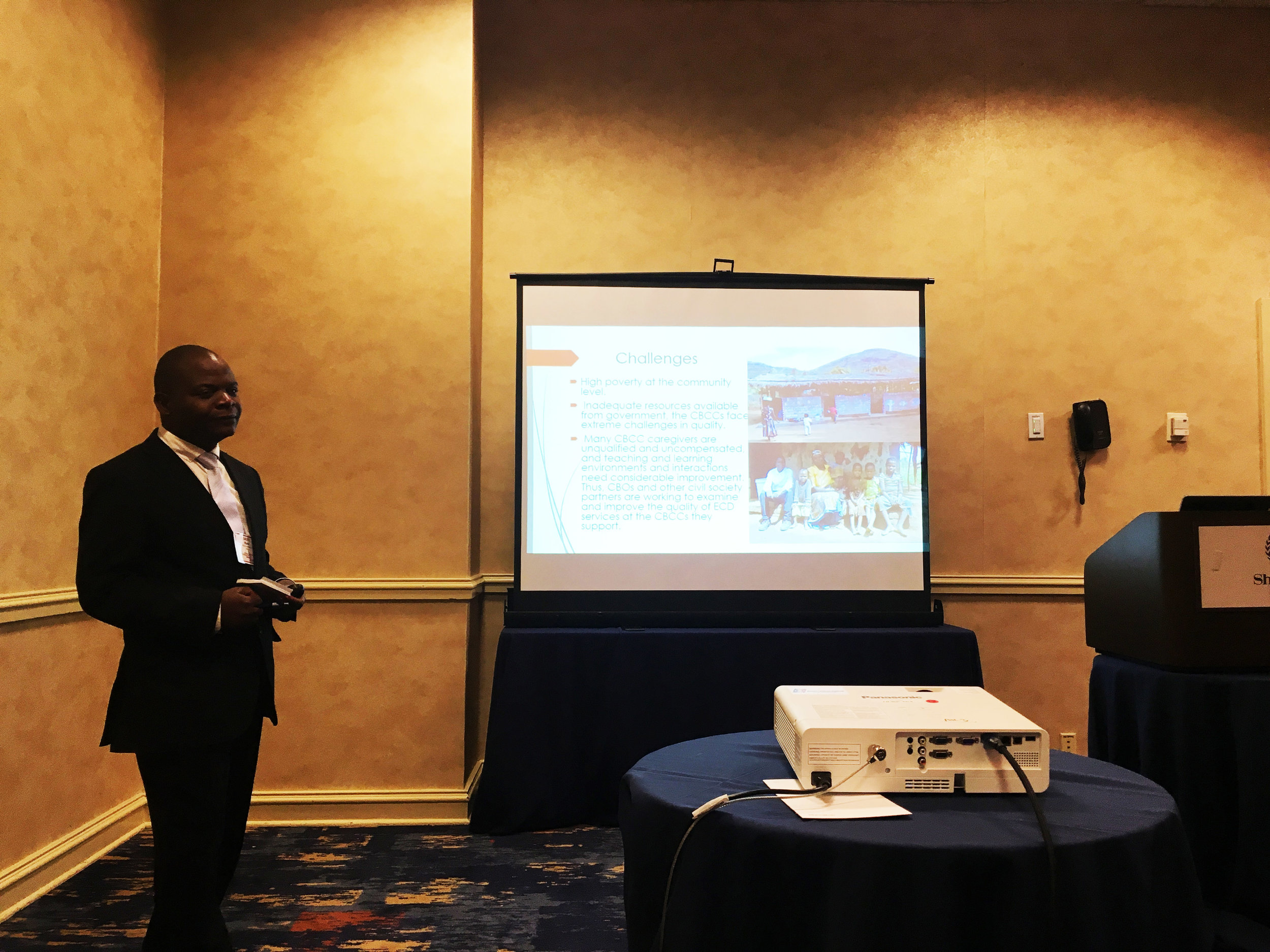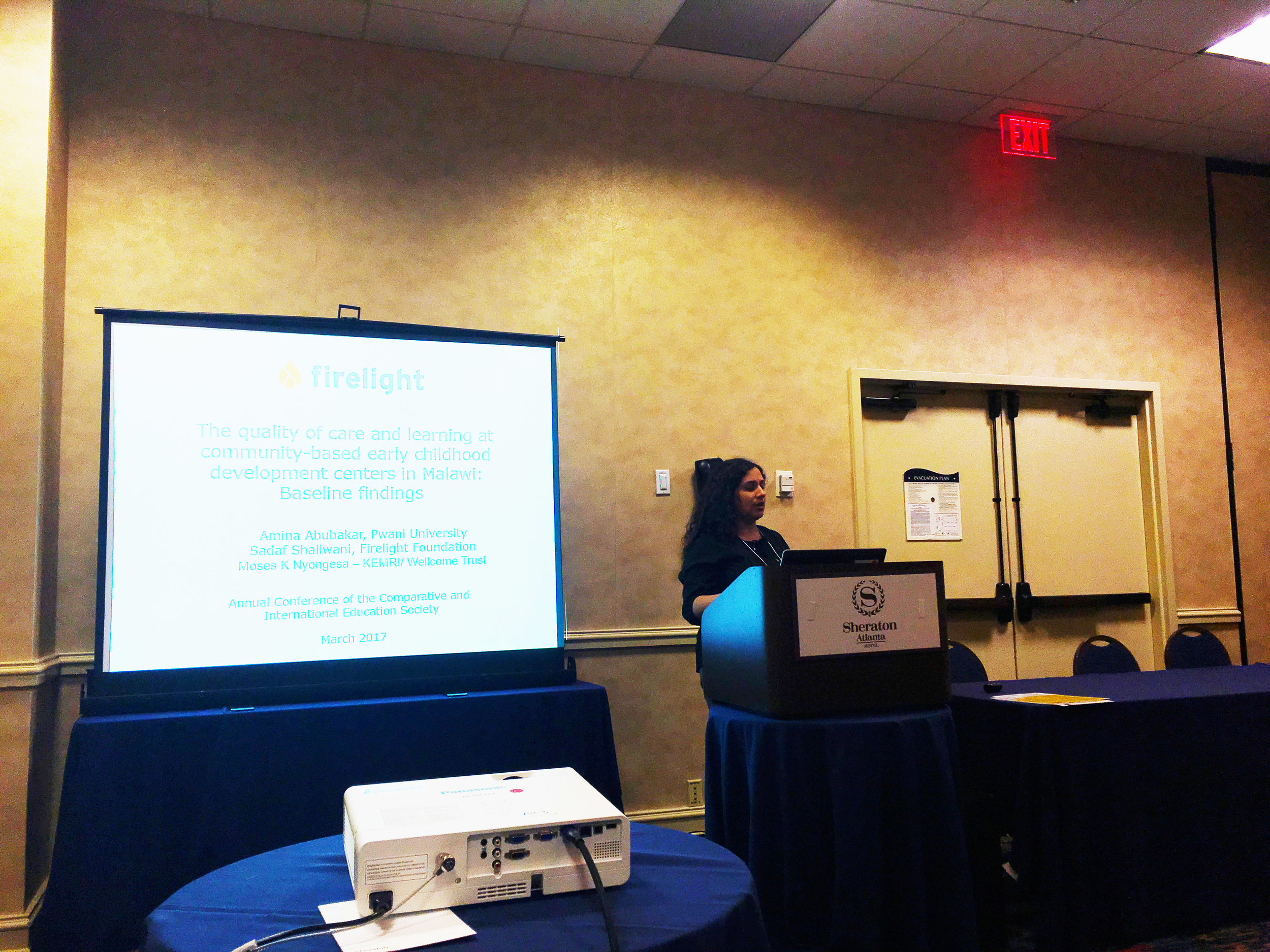Understanding ECD quality in Malawi: Reflections on Firelight panel at CIES
Earlier this month, Firelight was honored to facilitate a panel of presentations sharing the first year of our work in Malawi to build the capacity of our partners and improve the quality of early childhood development (ECD) centers they support. This panel was part of the annual conference of the Comparative and International Education Society (CIES), held in Atlanta, Georgia, and was organized as part of the Africa Special Interest Group of the CIES. We were thrilled to have a diverse and engaged audience of practitioners, peer organizations, donors, scholars, and students at our session. The panel started off with Firelight’s Executive Director, Nina Blackwell, providing an introduction to Firelight and some background on the ECD quality improvement initiative in Malawi. Nina explained how Firelight has facilitated a civil society partnership including local community-based organizations (CBOs) in Malawi, a nongovernmental organization (NGO) specializing in community-based ECD in Africa, and a university researcher. The goal of this initiative has been to design and implement a comprehensive and tailor-made initiative to build capacity among CBO partners and thereby improve quality in the CBCCs that they support. Firelight and our partners co-created a multi-year intervention using different strategies to build capacity and monitor progress, including site visits, different levels of trainings, onsite mentoring, additional financial resources to CBOs to apply their learnings, and ongoing follow-up and support. Most importantly, the process has been iterative such that learnings from each phase inform and refine the next.
The first presentation was presented by Saeed Wame, Executive Director of the Namwera AIDS Coordinating Committee (NACC), which serves as Firelight’s Lead Partner for our Community-Based ECD initiative in Malawi. Saeed provided an overview of the context for young children in Malawi, the Community Based Childcare Center (CBCC) model, and the work of NACC and other CBOs in meeting the needs and supporting the development of young and vulnerable children in their communities. Saeed also highlighted the support and mentorship provided by NACC as Lead Partner to the smaller CBOs in their cluster, to strengthen both their organizational and programming capacity.

In the second presentation, Sadaf Shallwani, Firelight’s Senior Officer for Learning and Evaluation, shared findings from a comprehensive baseline assessment conducted at the start of the initiative with Amina Abubakar of Pwani University, which examined strengths and challenges at the target CBCCs, and highlighted both risks and opportunities to address in the capacity-building initiative. The CBCC classrooms were found to score relatively well on physical environment and interactions among ECD caregivers and children. However, there was considerable room for improvement in terms of the quality of actual learning experiences taking place in the CBCCs. Underlying challenges included the reliance on unpaid and unqualified teachers, as well as a lack of resources and materials at the CBCCs. However, underlying strengths included the awareness and involvement of community stakeholders in examining and improving the quality of care and learning at the CBCCs.

The final presentation was shared by Andrew Cunningham of the Aga Khan Foundation, who represented our colleagues Shafique Ismail and Musoke Ismael Nooh from the Madrasa Early Childhood Programme – Uganda, who unfortunately could not make it to the conference. Andrew presented the approach, activities, and learnings from the capacity-building work implemented thus far, as well as thoughts on next steps. The presentation highlighted the approach to capacity building co-created by Firelight and MECPU, including two key features of the approach:
- A layered Training of Trainers process in which CBO staff are trained and mentored to become trainers and mentors themselves to the ECD caregivers at the CBCCs they support.
- A phased and iterative process – including a scoping visit to initially understand the CBOs and their context in Malawi, an initial training and mentorship process, ongoing intensive capacity building, and finally a less intensive support phase in which local CBO trainers take a greater leadership role in the quality improvement process and MECPU provides background support as needed.
After each phase, the MECPU, NACC, and Firelight reflect on the experience and learnings, which then inform and refine the plan for the next phase.
After the presentations, Jennifer Schauffler from the Bainum Family Foundation offered her insights and proposed some questions to the panelists. This led into an engaged and captivating discussion with the audience about the successes achieved, the challenges being addressed, and our plans to share this work and further engage stakeholders in Malawi.
We are happy to share both our panel summary and the slides for each presentation here.
We extend our sincere thanks to our Lead Partner, the Namwera AIDS Coordinating Committee and our CBO partners in Malawi – COPRED, Chinansi, TIPOLISO, and Youth Impact; our capacity-building partner, the Madrasa Early Childhood Programme – Uganda and their colleagues at the Aga Khan Foundation; our academic partner Dr. Amina Abubakar; and our generous funders, the Conrad N. Hilton Foundation and the Bainum Family Foundation, for their partnership and support in planning the panel and for the initiative as a whole.
We are looking forward to conducting the midline assessment of ECD quality next month, and continuing to implement and reflect on capacity building in the coming months and years of the initiative.
We would love to receive your thoughts, questions, and reflections on the progress made thus far and plans for the next phase. Thank you all for your support!

